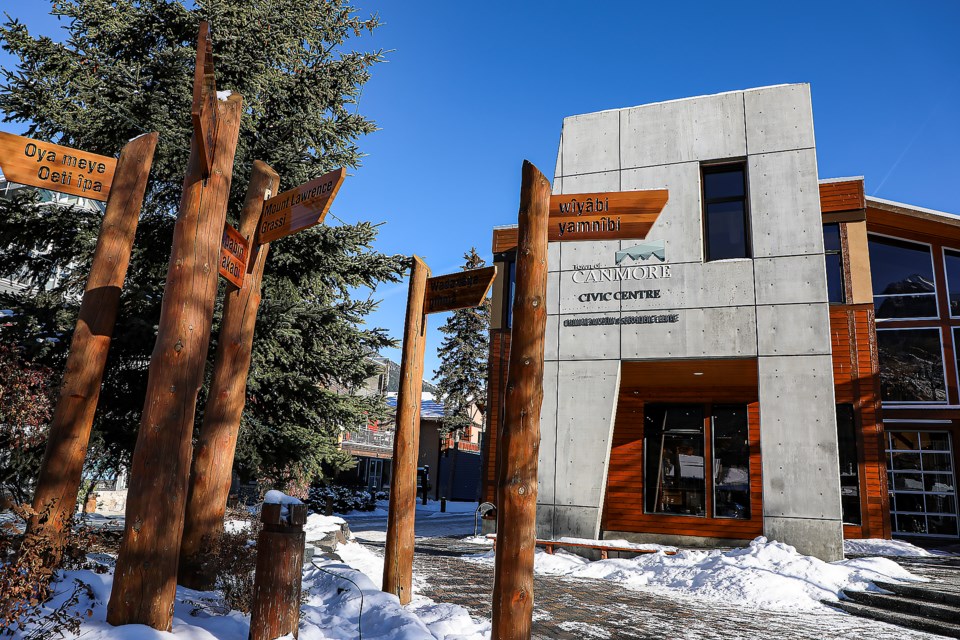CANMORE – Inflation and interest pressures will likely see Canmore residents have a higher than originally expected tax increase for 2024.
The Town’s finance committee recommended a budget increase of 7.6 per cent for council consideration, but only after a last-ditch attempt to curtail outside influences that had led 5.5 per cent to go to 7.8 per cent since first set at last year’s return to a multi-year budget.
The financial crunch of inflation and interest being felt across the country led to the finance committee starting off at a 7.8 per cent increase when additional factors such as $550,000 for cost of living adjustments, $222,000 for third-party costs like RCMP and $125,000 power and natural gas led to the increase.
“Nobody likes a tax increase, but we have to be responsible to the services we provide and we have to be responsible to the operations we’re funding,” said Mayor Sean Krausert. “I believe there’s been some really excellent conversation and excellent discussion and thoughtful consideration from members of the committee and administration getting here and I know it takes a lot of work to get here.”
He noted when the 5.5 per cent was approved last year, it was likely to be impacted as more information on costs that were trending higher became known. He pointed out finance committee was able to add the Safe Park program into the budget and add money for fruit tree removal on public lands and balanced it by finding cuts elsewhere.
The median residential household is valued at $969,000 in Canmore and with a projected 7.6 per cent increase, it would mean an annual increase of $151 or $12.58 a month.
If a 5.5 per cent increase were to be passed by council, the annual increase would be $109 or $9.11 a month. At 7.8 per cent, the annual jump for residential property taxes would be $155 or $12.92 a month.
A one per cent increase in the budget equates to about $320,000.
The education requisition, which is set by the province but collected through property taxes, is usually finalized by the provincial government in the late winter or early spring.
Historically in Canmore, the education tax requisite has been about half the annual property tax bill.
The finance committee had directed Town staff to return with options for a potential 2.3 per cent decrease in what was at the time a 7.8 per cent increase.
Sally Caudill, the Town’s CAO, said municipal staff put together all service level increases for the coming year and had each department manager review their budgets and submit potential reductions.
The Town’s three general managers analyzed the submissions and reviewed for additional potential options, which led to a 2.5 per cent presented to finance committee for possible decreases ranging from one-time savings, permanent reductions and scaling back a series of administration options.
Finance committee approved the community evaluator position to be full-time, but amended the Safe Park program to have Town staff use 2023 participation numbers for revenues to cover contracted services and expenses.
The motion, brought forward by Coun. Karen Marra, is intended to have the program be more cost recovery-based. Information on the revisions will return for council consideration.
“We’ve been saying everyone has their part in contributing and making this community work and has the responsibility to pay their portion or what they can pay,” she said.
The arts and events micro-grant program was deferred to 2025, with Couns. Wade Graham, Jeff Mah and Joanna McCallum opposed. A citizen input panel and its associated contract costs were cancelled in 2024, with the intent of returning in 2025 when a new position in the communications department is set to come forward for finance committee and council consideration.
The fruit tree removal and replacement on public land had $30,000 annually from 2024-28 included in the budget, while a motion to increase the fruit tree removal program from $10,000 a year to $20,000 a year was defeated.
However, the Biosphere Institute of the Bow Valley is waiting for a potential grant from the Calgary Foundation, multiple council members noted, which could lead to an expansion of the program. Town staff will also return to council in 2024 when the fruit tree removal program is fully utilized, which occurred for the first time in 2023.
A motion to defer the creation of a facilities supervisor until 2025 was defeated, with Marra and Coun. Tanya Foubert in support. Town staff had cautioned on the impact the one-year deferral could have on the base budget, particularly as facilities age, new facilities come online, delivering services, staffing challenges, project delivery and the high need for the position.
“I believe I heard administration state we are at a tipping point and they’re struggling to be able to provide time off for staff that have earned it without the addition of this position,” said McCallum. “If there’s one thing I realize is that our staff need to be able to take their time off and they need to be able to make sure that they are being cared for as well.”
The budget will return to council Dec. 5, which gives additional time for further consideration and possible changes.
“I think we’re still on target for a municipal tax increase that’s in line with inflation and population growth and I think for me, that’s the sweet spot,” said Foubert. “I see a lot of options administration has brought forward that are just things I’m not willing to cut from the budget to get below inflation and population increase.”
MUNICIPAL PROPERTY TAXES
- 2024: 7.6 per cent – $34.88 million collected
- 2025: 7.2 per cent (forecasted) – $37.78 million estimated collected
- 2026: 3.2 per cent (forecasted) – $39.41 million estimated collected
*Education tax requisite is set by the province in late winter/early spring each year, but collected through property taxes.*




